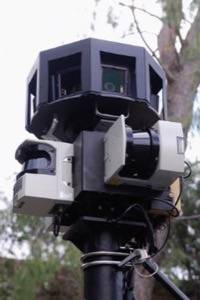What if your activities were watched and recorded so we could not only catch you for any crime but could maximize how much money we make selling you stuff? An editorial by Toby Considine over at Automated Buildings suggests that this is fast becoming the future we’re moving into.

Considine gives one example of a British murder conviction that was based on evidence obtained via Electrical Network Frequency Analysis (ENF). While detectives have long been rendering this kind of data by deciphering faint signals from the machines we use, what’s new is the huge increase in devices that can be monitored. The cost to capture and store data continues to drop, too. Enter the talented salesperson who knows the more they know about you, the more money they make. Enter a new era of a trillion Web-connected devices known as the Internet of Things. Got privacy?
Considine’s editorial has a remarkable title and a lengthy byline: Smart Energy and the End of Privacy – There is now no reason ever to throw out information. Operational data will be the new battleground for privacy.

Google Street View
As routinely covered in This Week in Online Tyranny the Google cars are in trouble for trolling neighborhoods for web traffic data. Or how about today’s coverage of Google vs. World, which is a map that highlights Google legal woes, many of which are related to privacy. Considine refers to the basis upon which these legal concerns are being raised when he says:
“Without privacy, the social contract is changed. Zero tolerance combined with no privacy removes every civil right we have. The CEO of Google has stated “Privacy is dead, get used to it.” On the other hand, the German high court recently mandated early deletion of all cell tower data, web traffic, IM tracking, and other “personal acts.” The battle for privacy is already publicly engaged. The more people know, the more people are going to care.”
They’ll Want To Run You the Way They Run Casinos
Considine also explains how an early adopter of building unique data profiles for each individual customer are casinos in Las Vegas. The super secret Wal-Mart data centers in Missouri and Arkansas have also long been suspected of similar surveillance technologies. In short, your behavior is being charted to maximize your profitability. What’s more, once users start wiring their homes to a smart grid in order to be more green your unauthorized sales representative may be able to discern your purchasing patterns based on the types of devices you plug into your walls. Or what if you didn’t know that you were pinging TV advertisers every time you took food out of your internet-connected refrigerator?

What’s more, Las Vegas casino surveillance data is derived by each casino in a highly competitive atmosphere where great effort is made to ensure one casino’s data does not end up in the hands of a competing casino. So what if casino vs. casino surveillance expands to an entire grocery store of product, each product with their own sales representative wanting more information about you?
Location-Based Malware May Soon Track You in the Real World
On the Web when you move your mouse, or click, or type it can be tracked using malware and other tools. Yet simple measures can be taken to protect yourself from this kind of tracking. So now that location-based software is making it easier to track where you are in the real world we now have the need to protect ourselves from the advent of location-based malware.
Last winter our Ads With Eyes post explained the Center for Democracy & Technology’sreport about how digital signage with face recognition and RFID sensing are going to identify you and communicate with you in ways that are profitable for advertisers. But what about your right to opt out? Will these ads be able to sell your facial recognition and purchasing data to other advertisers?
Public Oversight
Learning how to maintain our privacy amid so many newly introduced Web-connected machines is not going to be easy. Yet European leadership and even US congressional hearings are beginning to take note. As Internet of Things continues to develop more privacy issues are going to arise. That’s in part why ReadWriteWeb’s Marshall Kirkpatrick’s recorded a new podcast called: Thoughts on Privacy and the Internet of Things
If you have any additional insight that may benefit our readers regarding this issue please post them in the comments below.
photos from (in order) Wiki Commons, John Delorey and A. Strakey.

















